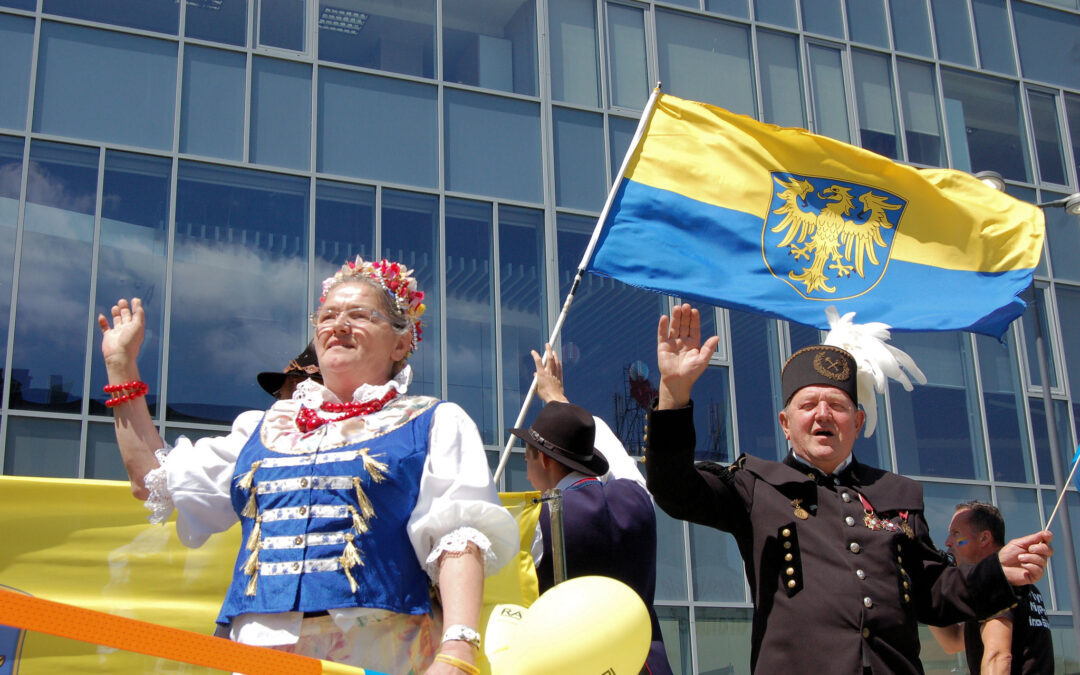Keep our content free from ads and paywalls by making a donation to support our work!

Notes from Poland is run by a small editorial team and is published by an independent, non-profit foundation that is funded through donations from our readers. We cannot do what we do without your support.
Poland’s first-ever university programme to train teachers of Silesian language and culture has been launched. All available places on the course were filled within three days.
The free postgraduate studies for teachers are being offered by the University of Silesia in Katowice with financial support from the education ministry. The university says it wants to “train [teachers] to assume the role of leaders in regional linguistic, literary and cultural education”.
“Residents of the region are citizens of this country,” said Ryszard Koziołek, the university’s rector. “They have the right to have their language and culture be the subject of academic research, but also the subject of education.”
The two-semester-long programme looks, among other things, at the place of Silesian among Slavic and other European languages; explores its use in various contexts, including literature, theatre, media, folklore and formal settings; and equips teachers with the skills needed to teach Silesian.
Inaugurujemy studia podyplomowe – Region – język i kultura. Ustawa o języku śląskim została zawetowana przez Andrzej Dudę, ale z kolejną – mam nadzieję ostatnią już próbą wracamy w przyszłym roku, tuż po zmianie na stanowisku Prezydenta. A teraz skupiamy się na przygotowaniu… pic.twitter.com/76EBzTZW41
— Monika Rosa (@moanrosa) November 16, 2024
According to the most recent Polish national census, Silesian is used by around 460,000 people as their main tongue at home, mainly in Silesia itself, a historical region in southwest Poland.
However, it is not officially recognised as a language in Poland, with many instead perceiving Silesian as a dialect of Polish. This year, the ruling coalition passed a bill to recognise Silesian as a regional language, but it was vetoed by President Andrzej Duda, an ally of the conservative opposition.
Such official recognition allows a language to be taught in schools and used in local administration in municipalities where at least 20% of the population declared in the last census that they speak it.
President Duda has vetoed a law that would have made Silesian a recognised regional language in Poland.
He argued that Silesian is a dialect of Polish, rather than a language in itself, and also cited national security concerns https://t.co/QpFfVXnaes
— Notes from Poland 🇵🇱 (@notesfrompoland) May 29, 2024
Despite Duda’s veto, the government has pledged to find ways to support Silesian. In June, the education ministry assigned 1.6 million zloty (€370,000) for the support of Silesian language, identity and culture.
“We have kept our promise,” said education minister Barbara Nowacka at the launch of the new university course. “The money we assigned at the education ministry was well spent…It is important that the state supports the power of diversity.”
“I am glad that teachers will be able to improve their skills here in Silesia, so that they can support young people in understanding their local homeland,” she added. According to Nowacka, places on the course were filled within three days of being made available.
Silesian, which is spoken in southwest Poland, has been added as a language on Google Translate.
The decision comes shortly after Poland’s own president vetoed a law recognising Silesian as a language. He says it is actually a dialect of Polish https://t.co/mXhmFgbchU
— Notes from Poland 🇵🇱 (@notesfrompoland) June 30, 2024
Speaking alongside her, Wojciech Saługa, governor of the Silesia province, expressed his regret that Duda had vetoed the bill. He said that he will ask all candidates in presidential elections next year – when Duda’s final term in office ends – about their willingness to sign such legislation into law once they take office.
In justifying his veto, Duda not only argued that Silesian is a dialect, rather than a language, but also suggested that signing the bill could threaten national security.
Given the “current social and geopolitical situation…related to the war being waged on the eastern border”, there must be “special care to preserve national identity”, including “cultivating the native language”, said the president.
The president’s decision to veto a law recognising Silesian as a language has reignited a debate that is ostensibly linguistic but at its heart is a struggle over culture, identity and, for some, the integrity of the Polish state itself https://t.co/HNgQ2436G7
— Notes from Poland 🇵🇱 (@notesfrompoland) July 9, 2024

Notes from Poland is run by a small editorial team and published by an independent, non-profit foundation that is funded through donations from our readers. We cannot do what we do without your support.
Main image credit: Kris Duda/Flickr (under CC BY 2.0)

Agata Pyka is a former assistant editor at Notes from Poland. She specialises in Central and Eastern European affairs, cybersecurity, and investigative reporting. She holds a master’s degree in political communication from the University of Amsterdam, and her work has appeared in Euractiv, the Balkan Investigative Reporting Network (BIRN), and The European Correspondent, among others.



















